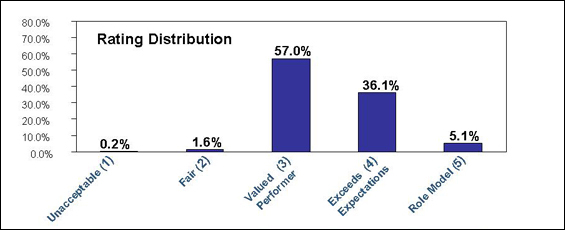Winners and Losers
Will higher pay increases be enough to keep Defense employees under a new personnel system motivated?
The new pay-for-performance system at the Defense Department is expected to set the pace for the rest of government for employee performance and improving leadership. And with recent hype surrounding this year's average Defense pay increase, workers governmentwide may no longer find that pace so unsettling.
The Pentagon announced last Thursday that 98 percent of the 110,000 employees under the National Security Personnel System received performance-based payouts averaging 7.6 percent. That's more than twice the percentage given to General Schedule employees, who had a 2.5 percent across-the-board pay increase and an additional 1 percent bump in locality pay.
Here's how the average NSPS payout broke down:
| Salary | Bonus | ||
|
Perfomance Increase
Pay Band Adjustment Locality Pay |
3.4%
1.5% 1.0% |
1.7%
|
Total |
| Average Payout | 5.9% | 1.7% | 7.6% |
Still, it's important to note that the average NSPS payout is not directly comparable to the annual raise that General Schedule employees receive. Under NSPS, funds that the GS system directs to within-grade pay boosts, quality step increases and bonuses are factored into the overall performance-based raise. General Schedule employees will have earnings potential beyond just their annual increase.
And, unlike the GS system, NSPS does not award pay increases to employees who don't receive an acceptable performance rating. That means more funds can be allocated to employees who perform above expectations. Employees with a low rating of one or two did not see performance-based increases in their paychecks this year.
Here's how NSPS employees fared in terms of performance ratings:

The same day NSPS employees received the new pay boost in their checks, Government Executive hosted a webinar with Mary Lacey, program executive officer for NSPS. She gave details on the 2008 payouts as well as what's ahead for NSPS.
"There were a lot of concerns that [NSPS] was reducing the amount we paid civilians," Lacey said. "First of all, nothing could be further from the truth.... We believe that we should be spending the civilian pay money on our civilians. It should not be a bill payer for other things, and we kept that promise."
NSPS also brings another monetary benefit that's not available anywhere else across government, according to Lacey. Each year, Defense can award an additional pay increase to an entire team with outstanding performance. "We've been able to give a bonus to a team for years, but [NSPS] provides a salary increase to a team who pulled together for a task," she said.
The performance-based payouts and other opportunities under NSPS may look good on paper, but even Lacey admits there are still a lot of kinks to be worked out. "It's the whole change thing," she said. "Some people find the change too hard, and they can't move with it."
Another challenge, she said, is boosting the leadership skills of Defense managers. In a poll taken during the webinar, which consisted mostly of employees already in NSPS, only about 25 percent agreed that the system improved management's ability to lead. Additionally, 38 percent of those polled said they were unsure, while 37 percent disagreed with the statement.
"The journey to increase the leadership skills of our managers and supervisors is not a short one," Lacey said. "I'm not surprised we are where we are, and it's something we'll continue to pay attention to."
Meanwhile, a separate webinar poll indicated that NSPS actually may be accomplishing one of its major goals: using pay differentials as an incentive for better work. According to the poll, 54 percent agreed that pay would motivate them, while 28 percent were unsure, and 18 percent disagreed.
Still, it may be a long while until NSPS employees can determine whether larger pay increases can fill the void of lost opportunities. Unlike the General Schedule, which offers several opportunities for advancement, NSPS employees likely will see only two promotions in an entire career.
"We have to reinforce to folks that movement does come through these structural raises in January," Lacey said. "If they're a good, solid performer, it's the same speed they would have moved through the GS levels, but the top-notch performers will move up much, much faster."
It's too early to tell whether performance-based pay increases will be enough to motivate employees and keep them on the job. "To move to a new job may or may not carry with it a pay raise," said one NSPS employee who requested anonymity. "There is not much incentive to take on significantly more responsibility and work."
Click here to view an archived version of the NSPS webinar.







